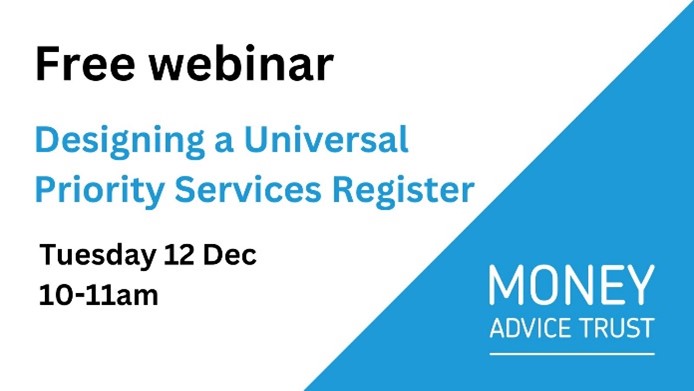Designing data-sharing: what matters for vulnerability and disability?
Chris Fitch explores the principles behind designing a Universal Priority Services Register
Posted December 4, 2023
On November 22nd, as part of its Autumn Statement activity, the UK Government announced a consultation which included questions on the potential creation of a Universal Priority Services Register (PSR).
A Universal PSR would enable data-sharing between service providers in different sectors where a consumer has informed one provider of a need for additional support, a reasonable adjustment, or change to service provision.
However, as data, data-sharing, and vulnerability increasingly feature in organisational, Government, and consumer discussions throughout the coming year, this raises the question: what principles should shape the design and development of such data-sharing initiatives? At the heart of this, I’m sure will be the following three principles which we will discussing in our upcoming webinar on designing a universal PSR on the 12th of December.

1. We have to fully understand what disabled and vulnerable customers want from data-sharing.
Data-sharing programmes or initiatives are not just technical projects or challenges for firms, regulators, or Governments to solve. They are human endeavours where disabled and vulnerable consumers need to be in the room as co-designers (not just focus group participants). If firms do not do this, they will make assumptions about what these consumers want, and will overlook foreseeable future harms.
2. The purpose for data-sharing needs to be more transparently defined than just 'helping people'.
Those involved in data-sharing have to transparently explain what data they want to collect and share, what they will do with it, and who else they will share it with. They have to identify (with disabled and vulnerable consumers) what actionable support needs meeting. And - critically - they have to be crystal-clear about the different ways in which different firms across different sectors might use these data.
3. Much of this data will come from consumer disclosures - given there are already enough barriers to disclosure in existence, we therefore need to avoid creating new ones due to poor design.
Disclosure will remain central to much (although not all) future data-sharing activity. It helps make-up the 'water-source' that flows through the data-sharing pipes. We therefore need to design data-sharing that disabled and vulnerable consumers trust - and that means understanding what these consumers want in terms of transparency, control, and involvement. And to do that, we need to involve them.
Whatever the initiative or programme on data-sharing that unfolds in 2023/24, these three principles will need to be at the centre of any design to achieve good experience and outcomes for all.
But what other principles would you add to this list? To take part in the discussion, join our free webinar on 12 December to discuss what vulnerability data-sharing should look like in practice, what data it might usefully share, and what types of additional support and services it should cover.
We are bringing together a panel with expertise in energy, water, financial services, and consumer experience in disability and vulnerability. I’ll be joined by:
- Conor D'Arcy – Money and Mental Health Policy Institute (co-author of “Too much information? Key considerations for vulnerability data-sharing”)
- Dr Elizabeth Blakelock – Citizens Advice (publisher of “Closing the gap. How to improve consumer support in essential services”)
- Steve Crabb – Consumer Advocate (Independent Chair of the “Energy UK Vulnerability Commitment“)
- Dan Holloway – Disability Advocate, University of Oxford (author of “Building Bridges: A Project to Enable Better Services to Create Better Lives for Disabled People”).
Join us to explore how such a register might work, the principles that need to be central to its design, and the outcomes and unintended consequences it needs to deliver or avoid: https://register.gotowebinar.com/register/1419958130010668887
Chris Fitch is the Money Advice Trust’s Vulnerability Lead Consultant and Research Fellow at the University of Bristol’s Personal Finance Research Centre. View all posts from Chris Fitch.